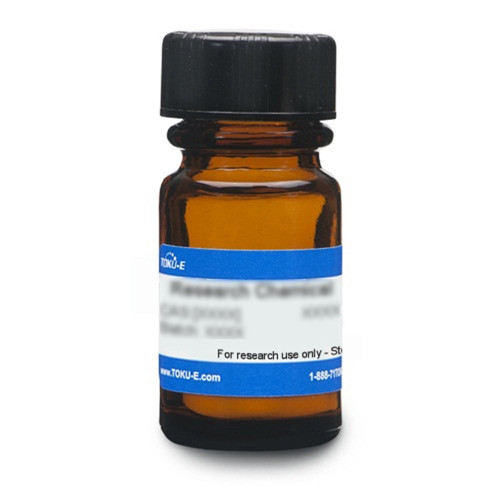Argatroban is a synthetic small molecule and potent thrombin inhibitor that functions as an anticoagulant agent. It can protect against thrombosis by limiting clot formation.
| Mechanism of Action | Argatroban is able to inhibit thrombin directly and univalently. The Ki values against thrombin range from 5 nM to 39 nM. |
| Eukaryotic Cell Culture Applications | Argatroban was applied to cultured rabbit aortic vascular smooth muscle cells, and the expression of myosin heavy-chain isoform mRNAs was evaluated. Authors found mRNA was homogenously expressed, thus inducing the phenotypic conversion of vascular smooth muscle cells (Yoshinaga et al, 2003). The effect of Argatroban on endothelial cells experimentall injured by thrombin were investigated using cell line TKM-33 cloned from human umbilical vein endothelial cells. Endothelial cells make plasminogen activator to maintain blood flow and prevent thrombosis. The treatment with Argatroban prior to thrombin injury resulted in the induction of plasminogen activator inhibitor-1 (PAI-1) secretion. Thus, Argatroban pretreatment can prevent thrombin injury of endothelial cells (Ueshima et al, 2000). |
| Cancer Applications | Argatroban was found to reduce breast cancer malignancy and metastatis in MDA-MB-468 human breast cancer cells that were stably transfected to overexpress osteopontin. Argatroban treatment of 25 µg/ml resulted in decreased cell growth, colony-forming ability, adhesion, and migration (Schulze et al, 2008). |
| Molecular Formula | C23H36N6O5S |
| Solubility | Slightly soluble in methanol, ethanol, DMF and DMSO. |
| References | Berry CN, Girard D, Lochot S and Lecoffre C (1994) Antithrombotic actions of Argatroban in rat models of venous, 'mixed' and arterial thrombosis, and its effects on the tail transection bleeding time. Br. J. Pharmacol. 113:1209-1214 PMID 7889274 Jeske W (1999) Pharmacology of Argatroban. Expert Opin. Investig.Drugs. 1988(5):625-654 PMID 15992120 Yoshinaga M (2003) Argatroban, specific thrombin inhibitor, induced phenotype change of cultured rabbit vascular smooth muscle cells. Eur J Pharmacol.461(1):9-17 PMID 12568910 Schulze EB et al (2008) The thrombin inhibitor Argatroban reduces breast cancer malignancy and metastasis via osteopontin-dependent and osteopontin-independent mechanisms. Breast Cancer Res. Treat. 112: 243 PMID 18097747 |


